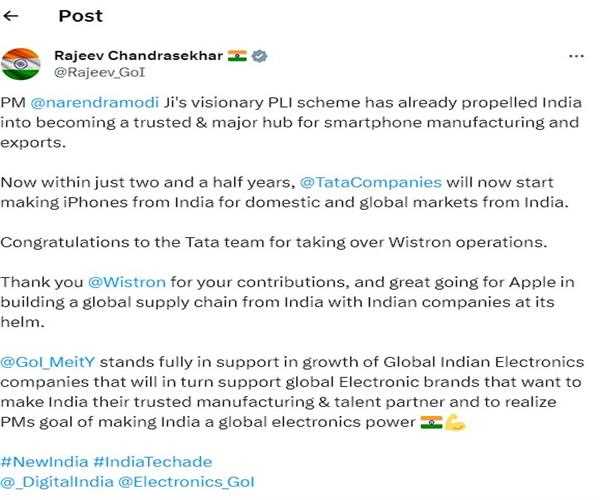Apple is forging a strategic alliance with India's Tata Group, designating the nation as its trusted hub for both manufacturing and nurturing top-tier talent. This dynamic partnership is poised to craft iPhones on Indian soil, marking a significant and exciting step forward.
Highlights:
- Electronics and Technology Minister Rajeev Chandrasekhar said today that the project will be completed within two and a half years, and that the government will support the Tata Group and other Indian electronics companies in their efforts to partner with global brands.
- Tata Group will hold a 100% stake in Wistron InfoComm Manufacturing (India) Private Limited (WMMI).
- Tata Group to manufacture iPhones in India for global market.
India has swiftly risen as a prime contender for Apple's iPhone production, with the Tata Group poised to manufacture these coveted devices for both the domestic and international markets.
Revealing this exciting development, Electronics and Technology Minister Rajeev Chandrasekhar affirmed that the project's completion is expected within two and a half years. The Indian government, he added, is firmly committed to supporting the Tata Group and other prominent Indian electronics companies as they collaborate with global brands.
Chandrasekhar, in a tweet, emphasized the government's dedication to nurturing the growth of dynamic Indian electronics firms, which, in turn, will serve as valued partners for global electronic brands seeking to establish India as their trusted hub for manufacturing and talent, aligning with the Prime Minister's vision of transforming India into a global electronics powerhouse.
This groundbreaking initiative took shape after Taiwan-based Wistron Corp., a key Apple contract manufacturer, granted approval for the sale of its Indian unit to the Tata Group for a substantial $125 million. Upon board approval, Tata Group will hold a 100% stake in Wistron InfoComm Manufacturing (India) Private Limited (WMMI). The deal is set to advance through the necessary regulatory channels, pending confirmation from all relevant stakeholders.
This strategic move signifies a noteworthy departure from Apple's traditional production strategy, which heavily leaned on Chinese manufacturing facilities. The ongoing US-China trade tensions and rising labor costs in China have compelled Apple to diversify its production sources. India, renowned for its vast consumer base, skilled workforce, and favorable government policies, has now emerged as an enticing and forward-looking choice for Apple's future production endeavors.
Notably, Apple has been assembling iPhones in India since 2017, commencing with the iPhone SE. Since then, the company has steadily expanded its operations, leading up to the local assembly of the highly sought-after iPhone 15 and iPhone 15 Plus models.





